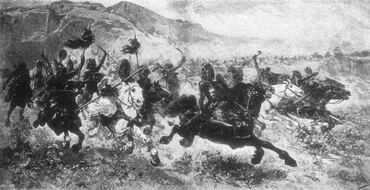1
Y cuando David y los suyos vinieron a Siclag al tercer día, los de Amalec habían invadido al mediodía y a Siclag, y habían herido a Siclag, y la habían quemado a fuego.
2
Y se habían llevado cautivas a las mujeres que estaban en ella, y desde el menor hasta el mayor; mas a nadie habían dado muerte, sino que los llevaron, y siguieron su camino.
3
Vino, pues, David con los suyos a la ciudad, y he aquí que estaba quemada a fuego, y sus mujeres y sus hijos e hijas llevadas cautivas.
4
Entonces David y el pueblo que estaba con él, alzaron su voz y lloraron, hasta que les faltaron las fuerzas para llorar.
5
Las dos mujeres de David, Ahinoam jezreelita y Abigail la que fue mujer de Nabal del Carmelo, también eran cautivas.
6
Y David fue muy angustiado, porque el pueblo hablaba de apedrearlo; porque todo el pueblo estaba con ánimo amargo, cada uno por sus hijos y por sus hijas; mas David se esforzó en el SEÑOR su Dios.
7
Y dijo David al sacerdote Abiatar hijo de Ahimelec: Yo te ruego que me acerques el efod. Y Abiatar acercó el efod a David.
8
Y David consultó al SEÑOR, diciendo: ¿Seguiré este ejército? ¿Lo podré alcanzar? Y él le dijo: Síguelo que de cierto lo alcanzarás, y sin falta librarás la presa .
9
Se partió, pues, David, él y los seiscientos hombres que con él estaban , y vinieron hasta el arroyo de Besor, donde se quedaron algunos.
10
Y David siguió el alcance con cuatrocientos hombres; porque los doscientos se quedaron, que estaban tan cansados que no pudieron pasar el arroyo de Besor.
11
Y hallaron en el campo un hombre egipcio, el cual tomaron, y trajeron a David, y le dieron pan que comiese, y a beber agua;
12
y le dieron también un pedazo de masa de higos secos, y dos hilos de pasas. Y luego que comió, volvió en él su espíritu; porque no había comido pan ni bebido agua en tres días y tres noches.
13
Y le dijo David: ¿De quién eres tú? ¿Y de dónde eres? Y respondió el joven egipcio: Yo soy siervo de un amalecita, y me dejó mi amo hoy hace tres días, porque estaba enfermo;
14
pues hicimos una incursión a la parte del mediodía de Cereti, y a Judá, y al mediodía de Caleb; y pusimos fuego a Siclag.
15
Y le dijo David: ¿Me llevarás tú a aquel ejército? Y él dijo: Hazme juramento por Dios que no me matarás, ni me entregarás en las manos de mi amo, y yo te llevaré al ejército.
16
Y así lo llevó; y he aquí que estaban derramados sobre la faz de toda la tierra, comiendo y bebiendo y haciendo fiesta, por toda aquella gran presa que habían tomado de la tierra de los filisteos, y de la tierra de Judá.
17
Y los hirió David desde aquella madrugada hasta la tarde del día; y no escapó de ellos ninguno, sino cuatrocientos jóvenes, que habían subido en camellos y huyeron.
18
Y libró David todo lo que los amalecitas habían tomado; y asimismo libertó David a sus dos mujeres.
19
Y no les faltó cosa chica ni grande, así de hijos como de hijas, del robo, y de todas las cosas que les habían tomado; todo lo recobró David.
20
Tomó también David todas las ovejas y ganados mayores; y trayéndolo todo delante, decían: Esta es la presa de David.
21
Y vino David a los doscientos hombres que habían quedado cansados y no habían podido seguir a David, a los cuales habían hecho quedar en el arroyo de Besor; y ellos salieron a recibir a David, y al pueblo que con él estaba . Y cuando David llegó a la gente, los saludó con paz.
22
Entonces todos los malos y los hijos de Belial de entre los que habían ido con David, respondieron y dijeron: Pues que no fueron éstos con nosotros, no les daremos de la presa que hemos quitado, sino a cada uno su mujer y sus hijos; los cuales tomen y se vayan.
23
Y David dijo: No hagáis eso, hermanos míos, de lo que nos ha dado el SEÑOR; el cual nos ha guardado, y ha entregado en nuestras manos el ejército que vino sobre nosotros.
24
¿Y quién os escuchará en este caso? Porque igual parte ha de ser la de los que vienen a la batalla, y la de los que quedan con el bagaje; que partan juntamente.
25
Y desde aquel día en adelante fue esto puesto por ley y ordenanza en Israel, hasta hoy.
26
Y cuando David llegó a Siclag, envió de la presa a los ancianos de Judá, sus amigos, diciendo: He aquí una bendición para vosotros, de la presa de los enemigos del SEÑOR.
27
A los que estaban en Bet-el, y en Ramot al mediodía, y a los que estaban en Jatir;
28
y a los que estaban en Aroer, y en Sifmot, y a los que estaban en Estemoa;
29
y a los que estaban en Racal, y a los que estaban en las ciudades de Jerameel, y a los que estaban en las ciudades del ceneo;
30
y a los que estaban en Horma, y a los que estaban en Corasán, y a los que estaban en Atac;
31
y a los que estaban en Hebrón, y en todos los lugares donde David había estado con los suyos.







